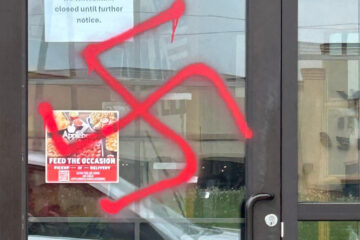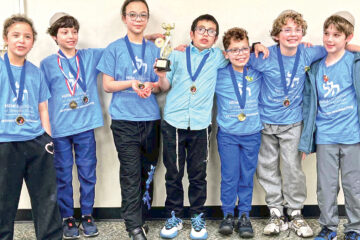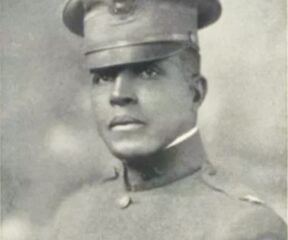Cantor at Beth Or to receive stem cell transplant before Rosh Hashanah

By Marshall Weiss, The Dayton Jewish Observer
Cantor Joyce Dumtschin, who was diagnosed with Myelodysplastic syndrome in 2009, is scheduled to receive a stem cell transplant at James Cancer Hospital in Columbus on Sept. 27, the day before the eve of Rosh Hashanah.
“Only 30 percent of people who need transplants can find donors in their families,” says Dumtschin, 55, “so I’ve been very lucky because my younger brother is a match for me.”
Myelodysplastic syndrome is a form of cancer in which bone marrow doesn’t make enough healthy blood cells; it causes infections, anemia and easy bleeding.
“I’ll go into the James Cancer Hospital on Sept. 20 and I will have about a week of high-dose chemotherapy,” she says. “And that will kill all or most of the cancer cells. It will also kill a lot of other things, so the counts for the red cells, white cells, platelets, they will be close to zero, if not zero.”
Her brother will donate his stem cells in Columbus through apheresis — a less invasive process than a bone marrow transplant — for infusion to Dumtschin’s blood.
“What my doctor said is that is Day Zero,” she says. “Hopefully, within about two weeks, those cells engraft themselves into my bone marrow and start producing those types of cells. The doctor says that’s like the first step of a marathon.”
The transplant process will leave her extremely weak, with little or no immune system. And just as with an organ transplant, there is a chance the new cells can reject her body.
“It could be acute or chronic, serious or mild, anything from dry eyes to liver problems,” she says. “They really keep an eye on that; some of the drugs used to control that also lower your immune system.”
Dumtschin says there’s a sense of urgency to undergo the transplant now.
“It’s kind of a fine line,” she says. “You have to be sick enough that it’s medically necessary but healthy enough that you’re going to survive it. There is a mortality rate associated with this, which I’m kind of ignoring. There are some things I want to know and some things I don’t want to know. The people who don’t survive, it’s usually an infection.”
Dumtschin decided the transplant offers her the best hope for recovery. The other two options were to continue with red blood cell transfusions to control her anemia. She’s had five already but says that eventually they become ineffective. Her doctor told her the second option, a more standard chemotherapy, “taps the breaks” but won’t cure anything.
For four weeks after the transplant, Dumtschin will begin recovery in an isolated room with filtered air at James Cancer Hospital. Precautions include a processed, pasteurized, low-bacterial diet for a year. She is able to bring her guitar along.
She and her husband, Irwin, will then live in an apartment near the hospital for four months; he’ll serve as her 24/7 caregiver. When they return home, he’ll continue as caregiver for another seven months. To prevent infections, Irwin must keep the apartment and their house immaculate; and his wife can’t be near cleaning supplies and must leave the room or wear a mask when he vacuums.
Their son, Nate, a 2010 graduate of Cincinnati State, will run the family business, Mocha Mavens, in Kettering during his mother’s year of recovery. Nate’s sister, Rachel, is a junior at Loyola University in Chicago.
“I will be on disability for a year,” Dumtschin says. “I could be ready to go dancing before that, but I’m not really sure. I’m hoping I’ll bounce back pretty well because I’m fairly healthy except the cancer, and I have a positive attitude. I want to watch funny DVDs. That’s what I’ve asked for. And interesting hats. Because I decided I’m not going to do the wigs.”
She says emotional support — talking with cancer survivors in particular — means much to her. “It doesn’t matter whether we’re rich or poor, clergy or laypeople or a medical professional — we’re all human.”
Editor’s note: During her lifetime, my mother fought several battles with cancer. The first came when my brother and I were in our early teens. Mom sat us down, told us what would happen, and explained all the hows and whys. Then she told us, “When I grew up, people whispered the word cancer. I will not whisper.”
While Cantor Joyce Dumtschin and I were going back and forth on her story (above), she told me of an article she recently read about a woman whose husband had lung cancer. Someone remarked to the woman that death could happen to any of us, that any of us could step off a curb and get hit by a bus. “Yes,” the woman replied, “but when you have cancer, the bus keeps driving around the block and honking the horn.”
To keep up with Joyce’s journey, go to caringbridge.org/visit/joycedumtschin.





